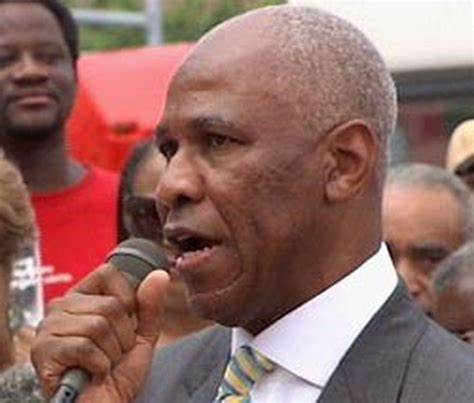In light of Memphis Mayor Jim Strickland’s suggestion that MLGW could be sold to pay for needed infrastructure improvements, the following is the timeline put together by John Branston for Memphis Flyer in 2007 for a similar idea by Mayor Willie W. Herenton. Mr. Branston broke the story at the time about the mayor’s interest in a sale.
By John Branston
January 1997: Willie Herenton appoints Herman Morris, who is then MLGW general counsel, to be interim president of MLGW.
June-August 1997: Rotan Lee, a utility consultant from Philadelphia (and no relation to Joseph Lee), introduces himself to Morris and Herenton. His brief contact with Morris doesn’t lead to anything. Lee goes to Herenton and signs a $150,000 contract as a consultant. Morris gets the president’s job officially.
August 1997: The Flyer, which broke the story about the possible sale of MLGW, reports details of the proposal from interviews with Herenton, Lee, and Allen Morgan Jr. of Morgan Keegan. They suggest a sale could fetch $800 million and make the city debt-free while lowering property taxes.
December 1997: The Flyer reports that MLGW sends out 3,000 cut-off notices per day and that there are about 400 cut-offs each day. Over one-fifth of MLGW customers are more than 30 days past due on their bills. The 1,900-member IBEW union and MLGW management oppose privatization.
Summer 1998: After meetings draw scant interest, Rotan Lee and Herenton drop plans for privatizing MLGW.
October 1999: Herenton is reelected for a third term, defeating several opponents, including city councilman Joe Ford. Ford’s brother Edmund is elected to the City Council, setting the stage for a seven-year saga of cut-off notices and careful treatment of Edmund Ford’s chronically overdue MLGW bills.
January 2001: MLGW’s board adopts, without discussion or publicity, a severance policy for Morris and other executives that collectively could pay them over $1 million if they “voluntarily” retire.
March 2002: A letter to Morris from CA editor Angus McEachran triggers the creation of a VIP list of influential Memphians and Morris relatives “who require my personal awareness, attention, or staff intervention when they have problems.” In an e-mail, Morris says the McEachran matter “could set editorial policy toward MLGW for years and must be handled with touch.” Apparently unknown to them, four CA editors and executives make the VIP list, which does not become public for five more years.
May 2002: Herenton, who makes $140,000, recommends a $231,000 salary for Morris after MLGW officials say that is what chief executives at 16 comparable utilities make. Morris gets a raise to $184,000 instead. His five-year term expires, but he continues to serve.
July 2003: A powerful windstorm roars through Memphis and does more than $100 million in damage. Herenton goes to Little Rock for a fund-raiser two days later. Morris and MLGW are criticized for their storm response and unwillingness to accept help from certain utilities.
August 2003: In a memo, Herenton suggests Morris give more business to local and minority firms on a $1.5 billion TVA bond deal.
October 2003: Herenton easily defeats Shelby County commissioner John Willingham and wins a fourth consecutive term as mayor.
November 2003: The Flyer reports that after the City Council balked at its rate-increase request, MLGW and Morris ignored Herenton and took their case directly to the public in full-page ads and opinion columns in the CA.
December 2003: Herenton calls MLGW “an island unto itself” and says it is wasteful and inaccessible. The utility’s souvenir bobblehead doll of Morris, the mayor says, is “self-aggrandizing advertising.” Board member James Netters, who is Herenton’s pastor, tells the Flyer that Herenton does not communicate what he wants to the board. Herenton proposes that city finance director Joseph Lee replace Morris, whose term has expired, but the council asks for a national search instead.
January 2004: Morris is succeeded by Netters, who serves as interim president for six months, earning approximately $95,000.
January 2004: The City Council and the CA call for an investigation of Herenton and the TVA bond deal. Eleven months later, although the council has done nothing, the CA publishes an editorial headlined “Council Probe Has Potential.”
January 2004: The Flyer reports details of Morris’ proposed severance package which, by Herenton’s calculations, totals $1,171,286 in severance, accumulated pension contributions, vacation, sick leave, and “storm restoration pay.” Herenton balks at the “vulgar” proposal. The CA ignores the Morris proposal and reports that “Morris bows out with $205,000.” By the Flyer‘s calculations, the actual final figure is closer to $500,000.
June 2004: Lee is renominated by Herenton and approved this time by the City Council. A new five-member board is also installed, chaired by Herenton’s former CAO Rick Masson.
2006-07: Lee orders subordinates not to cut off power to Edmund Ford. In February 2007, a federal grand jury orders Lee to appear to answer questions about the matter.
February 2007: A day after other media report the VIP memo, the CA publishes a story in which McEachran says he did nothing improper in contacting Morris, worked out a seven-year repayment plan for $10,000 owed to MLGW because of the utility’s meter and billing errors, and got no special treatment.
John Branston wrote the following story April 27, 2006:
Rotan Lee, who became something of a household word in Memphis in 1998 as a consultant on MLGW, died this week of heart failure in Philadelphia. He was 57.
Lee came to Memphis at the invitation of Mayor Willie Herenton, who wanted to explore the possibility of selling publicly-owned MLGW. The study never went anywhere, and Lee soon became a lightning rod for criticism. He was paid $150,000 plus expenses.
Lee was a well-known figure in Philadelphia. He was school board president, newspaper columnist, and radio talk-show host among other things.
“It wasn’t just Lee’s imposing 6-foot-4 stature that made him hard to ignore,” wrote the Philadelphia Inquirer in an editorial Wednesday. “He was one of the most articulate champions of educational achievement for all children that Philadelphia has ever had.”




